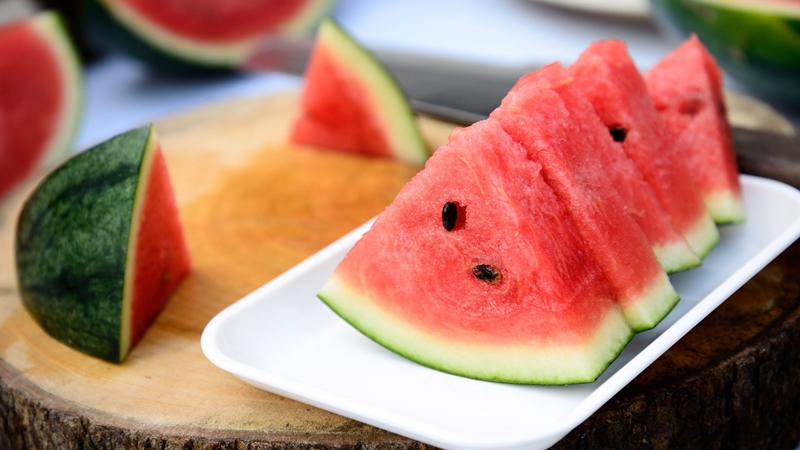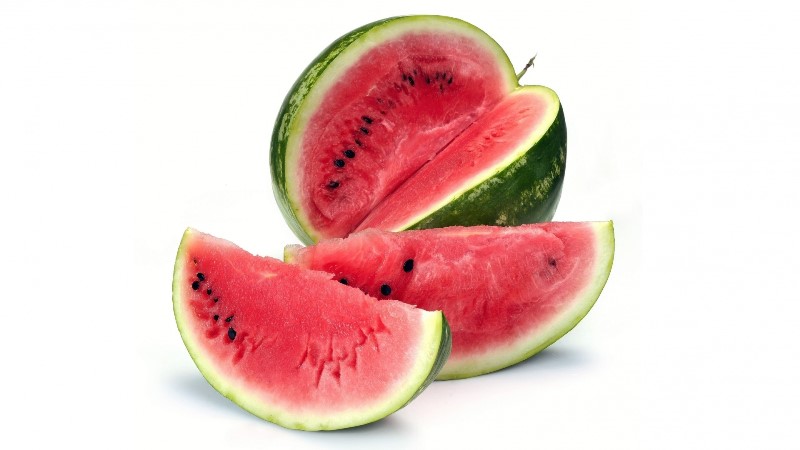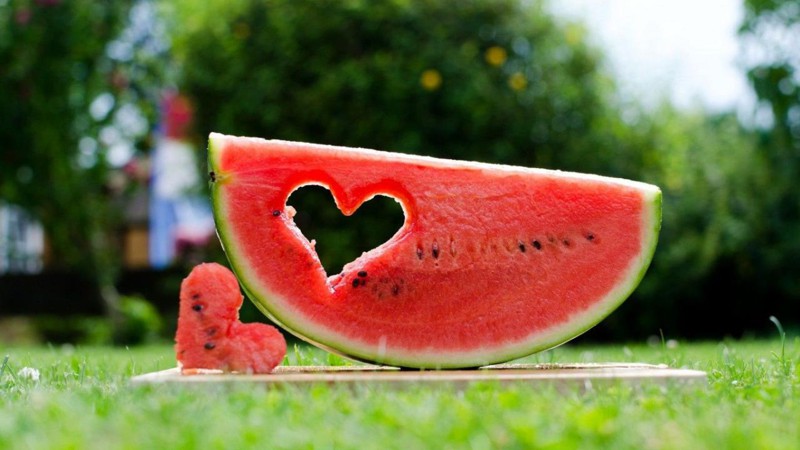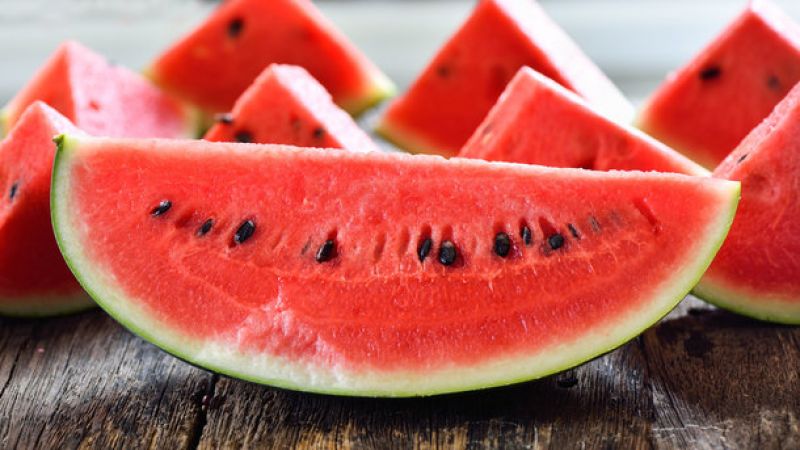Is watermelon diuretic or not: diuretic properties and rules of use
Fruit pulp watermelon inhibits the reabsorption of water and salts in the kidney tubules, increases the rate of urine formation, and reduces the fluid content in tissues and serous cavities. In folk medicine, watermelon is used as a diuretic for the treatment and prevention of liver and kidney diseases, arterial hypertension, and heart failure.
In the article, we will answer in detail the question of whether watermelon is a diuretic or not, we will tell you how it affects the urinary system and kidneys, what are the features of its use as a diuretic and whether it is possible to lose weight by using watermelon.
The content of the article
Is watermelon a diuretic or not?
The answer is yes. Watermelon has a pronounced diuretic effect: increases the secretion of urine and promotes the excretion of water and salts from the kidneys. Watermelon is inferior in effectiveness to pharmacy diuretics, but it is absolutely safe for health, practically does not cause side reactions and complications, and has excellent taste.

Diuretic properties
In traditional medicine, watermelon is used:
- as an effective diuretic;
- to dissolve calculi in the urinary system, which stimulates their speedy and painless excretion from the body;
- purified mineral resin normalizes metabolic processes and urination, improves digestion, reduces the concentration of calcium and oxalic acid, which reduces the risk of stones formation in the urinary system.
How to use watermelon as a diuretic
For medicinal purposes, fresh pulp, peeled from the skin, is used as a snack between meals... It is undesirable to combine watermelon with other products, even melon and other fruits. You can not drink watermelon with water, juice, tea, use with bread. In some cases, it is more efficient to process the pulp into juice.
The daily rate, thanks to which it is possible to achieve the desired effect, is determined in each individual case in different ways, paying attention to the features of the onset and course of the disease, the age and gender of the patient, and the presence of contraindications.
As a diuretic, experts recommend that an adult consume 2-2.5 kg of pulp per day. If we are talking about juice, then its one-time rate is limited to 500 ml. Watermelon drink can be mixed with apple, melon, strawberry juice.
For reference. The juice of the white pulp of the fruit is considered more valuable than the pink one. This drink is characterized by a more pronounced diuretic effect.

Purposes of use as a diuretic
Watermelon pulp is widely used in folk medicine. It is recommended to use it for the treatment and prevention of complications and relapses of hypertension, diseases of the liver, kidneys, heart and blood vessels.
With the help of watermelons, you can correct body weight, reduce weight. As a bonus - improved skin condition.
Treatment
The pulp and peel of watermelon is used as a medicinal raw material. Watermelons are especially useful for kidney stones. Once in the body, the amino acids present in the composition increase the alkalinity of the urine, the salts become soluble and, along with the urine stream, are removed outside.
This ensures a favorable outcome of the disease, minimizes the risk of recurrence and possible complications. In addition, watermelon acts as an anti-inflammatory agent: it inhibits the activity of inflammation, removes irritation of the mucous membrane of the urinary system.
Watermelon is a great helper with high blood pressure... It decreases peripheral vascular resistance by decreasing plasma volume, thereby lowering blood pressure. The positive properties of watermelon in hypertension include the ability to lower cholesterol levels, increase the strength and elasticity of the vascular walls and small capillaries.
Watermelon is used as a diuretic for diseases of the cardiovascular system, accompanied by edema. Excretion of excess fluid and salts from the body contributes to the recession of puffiness. Under the influence of the berry, the flow of blood to the heart decreases, due to which the load on the myocardium decreases, the signs of stagnation of blood circulation disappear.
Weight loss
Losing weight on a watermelon is tasty and simple. An obvious plus of berries when losing weight is their low calorie content (30 kcal per 100 g). Fruit pulp contains practically no fat (0.2 g), but it is rich in carbohydrates (7.2 g), to a lesser extent in proteins (0.6 g). The pulp contains plant fiber, which cleanses the digestive tract, removes excess fluid from the body, due to which weight loss occurs.

Pectin fibers improve digestion, normalize fat metabolism, accelerate lipolysis, normalize metabolism, lower cholesterol levels, increase endurance and work capacity, which leads to increased physical activity and additional burning of calories.
For reference. Watermelon, due to the presence of fiber, provides fast and long-lasting satiety, which allows you to reduce the volume of subsequent meals and avoid snacks.
There are several options for how to use watermelon in order to normalize and reduce body weight. A more strict option is a five-day express diet, which provides for the use of fruit pulp at the rate of 1 kg per 10 kg of human weight and free liquid. Water is necessary to maintain water and electrolyte balance, remove toxins and toxins that are released during the decomposition of body fat. The plumb line in five days is 5 kg.
The most optimal is a ten-day sparing diet, in which the diet, in addition to watermelon pulp, is supplemented with rye, bran or whole grain bread, water, and green tea. The average indication for weight loss is 5-7 kg, with physical activity it can reach up to 10 kg. With the right exit from the diet, the result can be fixed for a long time.
Contraindications

Watermelon has contraindications that must be identified and eliminated in advance. Before using the berry as a diuretic for the treatment of diseases or for the purpose of losing weight, be sure to consult with a specialist.
Absolute contraindication - individual intolerance one or more components of the composition, chronic renal failure, the formation of coral stones and large stones in the kidneys, phosphaturia (the presence of phosphate salts in the urine sediment).
To other diseases and pathological conditions, when eating watermelon can be harmful to health, include diabetes mellitus, diarrhea, colic. It is recommended to be eaten with caution by children, women during pregnancy and breastfeeding, and the elderly.
Read also:
How to cook fried watermelon seeds and how they are useful.
How to choose a ripe and sweet watermelon.
Is it possible to eat watermelon with cholecystitis and pancreatitis.
Conclusion
During the watermelon season, fresh pulp can be consumed every day, provided there are no contraindications. It contains B vitamins, sodium, magnesium, iron and other useful and nutritious components that improve overall well-being and health.
Special attention should be paid to watermelon for people with diseases of the kidneys, liver, cardiovascular system, arterial hypertension, accompanied by the formation of edema.Watermelon has a pronounced diuretic effect, it removes salts and excess fluid from the body, neutralizes puffiness. Also, watermelon perfectly cleanses the body and promotes healthy and effective weight loss.